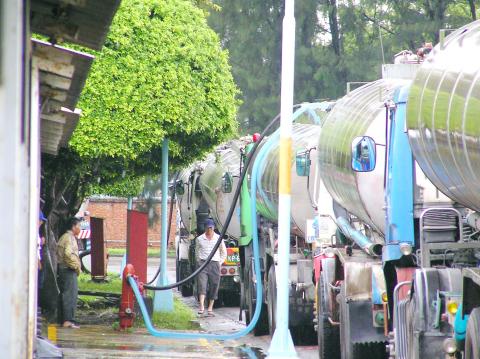Third-phase water rationing measures are to be implemented in Kaohsiung starting on May 4, affecting a total of 965,000 households and industrial users, the Ministry of Economic Affairs said yesterday, as a water shortage continues to impact the nation.
It will be the first time that third-phase water rationing — with water supply available only five days per week — is imposed in Kaohsiung, the ministry said.
“The water shortage in southern Taiwan is not likely to be relieved over the next two weeks,” Vice Minister of Economic Affairs Yang Wei-fu (楊偉甫) said after a water supply meeting.

Photo: Ko Yu-hao, Taipei Times
The ministry expects to conserve 170,500 tonnes of water per day through the new measures, he said.
Four of the seven industrial zones in Kaohsiung, or 2,439 manufacturers, are to be affected by the measures, the Industrial Development Bureau said.
Water supply to Yongan Industrial Park (永安工業區), Dashe Industrial Park (大社工業區), Renwu Industrial Park (仁武工業區) and Nantze Export Processing Zone (楠梓加工出口區) is to be restricted to five days per week, but supply to Linhai Industrial Park (臨海工業區), Linyuan Industrial Park and Dafa Industrial Park (大發工業區) — which draw their water from the Fongshan Reservoir (鳳山水庫) — will see only a 10 percent reduction, the bureau said.
It said that of the 2,439 manufacturers to be affected by the measures, 30 have said their businesses are likely to be impacted.
The companies are mainly producers of electronics, petrochemicals, machines and basic metals that use more than 1,000m3 of water per month.
“Given that the 30 companies run 24-hour operations, they have said they are likely to encounter difficulties if their water supply is cut by two days per week,” a bureau official, who declined to be named, told the Taipei Times.
The bureau plans to visit the affected companies on Monday to help them cope with the situation, the official said.
China Steel Corp (中鋼), the nation’s biggest steelmaker, yesterday said its operations would not be affected by the new measures, because its factories are in Linhai Industrial Park.
Advanced Semiconductor Manufacturing Co (ASE, 日月光半導體) said earlier this month that its newly completed water tank and water recycling facilities would help it cope with stricter third-phase water rationing.
ASE’s factories are located in the Nantze Export Processing Zone.
The ministry might consider postponing third-phase water rationing in Kaohsiung if a weather front forecast to pass through southern Taiwan early next month brings precipitation to the Gaoping River (高屏溪), Yang said.
In northern Taiwan, third-phase water rationing, which was introduced in New Taipei City, Taoyuan and Hsinchu on April 8, has helped the Shihmen Reservoir (石門水庫) maintain 50 million tonnes of water capacity.
“If the weather front brings rainfall next month, We will meet on May 4 and decide whether to resume water supply on a daily basis,” Yang said.
As the water level of Nanhua Reservoir (南化水庫) has dropped to 20.94 percent, the ministry might consider third-phase water rationing measures in Tainan in upcoming meetings, he said.
Additional reporting by Lisa Wang

INSURRECTION: The NSB said it found evidence the CCP was seeking snipers in Taiwan to target members of the military and foreign organizations in the event of an invasion The number of Chinese spies prosecuted in Taiwan has grown threefold over a four-year period, the National Security Bureau (NSB) said in a report released yesterday. In 2021 and 2022, 16 and 10 spies were prosecuted respectively, but that number grew to 64 last year, it said, adding that the Chinese Communist Party (CCP) was working with gangs in Taiwan to develop a network of armed spies. Spies in Taiwan have on behalf of the CCP used a variety of channels and methods to infiltrate all sectors of the country, and recruited Taiwanese to cooperate in developing organizations and obtaining sensitive information

BREAKTHROUGH: The US is making chips on par in yield and quality with Taiwan, despite people saying that it could not happen, the official said Taiwan Semiconductor Manufacturing Co (TSMC, 台積電) has begun producing advanced 4-nanometer (nm) chips for US customers in Arizona, US Secretary of Commerce Gina Raimondo said, a milestone in the semiconductor efforts of the administration of US President Joe Biden. In November last year, the commerce department finalized a US$6.6 billion grant to TSMC’s US unit for semiconductor production in Phoenix, Arizona. “For the first time ever in our country’s history, we are making leading edge 4-nanometer chips on American soil, American workers — on par in yield and quality with Taiwan,” Raimondo said, adding that production had begun in recent

Seven hundred and sixty-four foreigners were arrested last year for acting as money mules for criminals, with many entering Taiwan on a tourist visa for all-expenses-paid trips, the Criminal Investigation Bureau (CIB) said on Saturday. Although from Jan. 1 to Dec. 26 last year, 26,478 people were arrested for working as money mules, the bureau said it was particularly concerned about those entering the country as tourists or migrant workers who help criminals and scammers pick up or transfer illegally obtained money. In a report, officials divided the money mules into two groups, the first of which are foreigners, mainly from Malaysia

SILICON VALLEY HUB: The office would showcase Taiwan’s strengths in semiconductors and artificial intelligence, and help Taiwanese start-ups connect with global opportunities Taiwan has established an office in Palo Alto, one of the principal cities of Silicon Valley in California, aimed at helping Taiwanese technology start-ups gain global visibility, the National Development Council said yesterday. The “Startup Island Taiwan Silicon Valley hub” at No. 299 California Avenue is focused on “supporting start-ups and innovators by providing professional consulting, co-working spaces, and community platforms,” the council said in a post on its Web site. The office is the second overseas start-up hub established by the council, after a similar site was set up in Tokyo in September last year. Representatives from Taiwanese start-ups, local businesses and